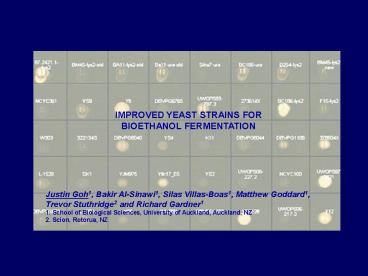IMPROVED YEAST STRAINS FOR PowerPoint PPT Presentation
1 / 38
Title: IMPROVED YEAST STRAINS FOR
1
IMPROVED YEAST STRAINS FOR BIOETHANOL
FERMENTATION
Justin Goh1, Bakir Al-Sinawi1, Silas
Villas-Boas1, Matthew Goddard1, Trevor
Stuthridge2 and Richard Gardner1 1. School of
Biological Sciences, University of Auckland,
Auckland, NZ 2. Scion, Rotorua, NZ
2
Bioethanol
Need for local biofuel industries
Bioethanol production using Saccharomyces
cerevisiae (yeast)
Used in bread, beer, wine.
Ethanol
3
Sugar/Starch feedstock
Sugar cane - sucrose
Corn - starch
Brazil
United States
Not a preferred option for NZ
4
Lignocellulosic feedstock
- Plant residues, agricultural wastes, forestry
biomass - Large, cheap resource
5
NZ forestry
- Largest accessible resource of fixed
carbon in NZ - 7 total land area
- Pinus radiata
- potential lignocellulosic feedstock
6
Lignocellulose
Crystalline cellulose 44
Hemicellulosic polysaccharides 30
Lignin 26
7
Lignocellulose
Pre-treatment
160-260ºC, steam, acid/alkaline treatment
8
Lignocellulosic
Saccharification
S. cerevisiae
Break down cellulose into glucose at 45-50ºC
Ethanol
Fermentation
S. cerevisiae ferment glucose at 25-30ºC
9
Cooling required prior to fermentation
Pre-treatment - 160-260ºC
Saccharification - 45-50ºC
Fermentation - 25-30ºC
- Contributes to high operating costs of
bioethanol production
10
Cooling required prior to fermentation
Pre-treatment - 160-260ºC
Saccharification - 45-50ºC
Fermentation 40ºC
- Thermotolerant yeast needed to ferment at higher
temperature
11
Aim of PhD project
- Breed thermotolerance genes into a commercial
bioethanol yeast strain
12
Hybrid vigour
- Genetically diverse parents
- Combination of different genes
- Hybrid progeny with superior characteristics
X
Hybrid
Parent 1
Parent 2
13
Hybrid vigour
- Genetically diverse parents
- Combination of different genes
- Hybrid progeny with superior characteristics
X
Hybrid
Parent 1
Parent 2
14
Hybrid vigour in yeast
Fermentation of parents hybrid strain at 37ºC
Hybrid
Commercial bioethanol strain
Fermentation performance
Laboratory strain
Time
(Simon Pang, BTech student)
15
Research strategy
(1) Screened yeast collection for candidate
parent yeast strains to be used in breeding
program
16
37ºC
42ºC
17
37ºC
42ºC
18
37ºC
42ºC
19
37ºC
42ºC
20
Candidate parental strains
- 20 yeast strains capable of growth at 42ºC
- Selected 34 strains
21
Genetic diversity tree of sequenced strains
YJM978
- Selected strains from diverse genetic backgrounds
22
- Selected strains from diverse environments
collected from around the world.
23
(No Transcript)
24
Research strategy
(2) Assess candidate yeast strains for
fermentation at high temperature
25
Measuring fermentation
2 Ethanol
Medium similar to Corn mash
2 Acetaldehyde
2 CO2
2 Pyruvic acid
CO2
CO2
CO2
CO2
26
CO2 weight loss from 34 yeast strains after
fermentation for 140 hours at 37ºC
Asian alcoholic beverages Commercial bioethanol
strains Clinical isolates Soil/plant
isolates Wine strains
CO2 weight loss (g)
Time
27
Total CO2 weight loss from 32 strains after
fermentation for 140 hours at 37ºC
Asian alcoholic beverages Commercial bioethanol
strains Clinical isolates Soil/plant
isolates Wine strains
Total CO2 weight loss (g)
28
Total CO2 weight loss from 32 strains after
fermentation for 140 hours at 37ºC
Asian alcoholic beverages Commercial bioethanol
strains Clinical isolates Soil/plant
isolates Wine strains
Total CO2 weight loss (g)
Asian alcoholic beverages
29
Total CO2 weight loss from 32 strains after
fermentation for 140 hours at 37ºC
Asian alcoholic beverages Commercial bioethanol
strains Clinical isolates Soil/plant
isolates Wine strains
Total CO2 weight loss (g)
Commercial bioethanol strains
30
Total CO2 weight loss from 34 strains after
fermentation for 140 hours at 37ºC
Asian alcoholic beverages Commercial bioethanol
strains Clinical isolates Soil/plant
isolates Wine strains
Total CO2 weight loss (g)
Clinical isolate
31
Research strategy future work
(3) Breed 4 best candidate strains with
commercial bioethanol strain.
Commercial bioethanol strain
Parent A
Hybrid 1a
Hybrid 1b
Hybrid 1c
Hybrid 1d
32
Research strategy future work
(3) Breed 4 best candidate strains with
commercial bioethanol strain
Commercial bioethanol strain
Commercial bioethanol strain
Parent A
Hybrid 1c
Commercial bioethanol strain
Hybrid 2a
Hybrid 2b
Hybrid 2c
Hybrid 2d
33
Research strategy future work
(3) Breed 4 best candidate strains with
commercial bioethanol strain
Hybrid 2d
Commercial bioethanol strain
Commercial bioethanol strain
Hybrid 3a
Hybrid 3b
Hybrid 3c
Hybrid 3d
34
Research strategy future work
(3) Breed 4 best candidate strains with
commercial bioethanol strain
Hybrid 2d
Commercial bioethanol strain
Commercial bioethanol strain
Hybrid 3a
Commercial bioethanol strain
Hybrid 4a
Hybrid 4b
Hybrid 4c
Hybrid 4d
35
Research strategy future work
(3) Breed 4 best candidate strains with
commercial bioethanol strain
Hybrid 2d
Commercial bioethanol strain
Commercial bioethanol strain
Hybrid 3a
Commercial bioethanol strain
Hybrid that is similar to commercial bioethanol
strain but can ferment at high temperature
36
Future biofuel strategy in NZ
- NZ forestry has great potential for use in
biofuels - Biofuel research should be catered to make use
of potential NZ resources - Significant investment required to establish
local biofuel industries
37
Acknowledgements
Professor Richard Gardner - Plant Molecular
Biology lab
University of Auckland Doctoral Scholarship
NERI research grant
38
Questions ?

